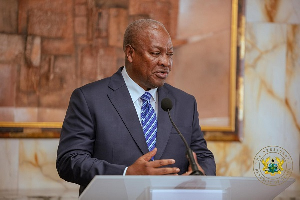.... & Managing Its Cost Is Everyone’s Business.
Can our fragile NHIS withstand the pressure and demand of its services?
Ghanaians certainly have more choices of food than ever before. We now also have relatively more access to hospitals, clinics and medicines, and therefore should be a healthy society. But, Ghanaians’ health has been declining and our average life-span is reducing over the years.
To promote and improve on health care delivery and health wellness the people and government of Ghana need to think of healthcare system in a holistic approach, by looking at the interrelated elements that affect the health of our people.
First, the food we consume has a major effect on our health. For example, the sugar, salt and fat content of our diets are perhaps accelerating our speedy journey to the health facilitates and grave yard prematurely due largely in part to our blissful ignorance of what is actually killing us so sadly.
Secondly, our environment is intricately linked to our health. I’m not a medical doctor, but it’s my conviction that , solving basic human problems —like domestic waste and poor sanitation, etc---are just as important as finding medical solutions to our aliments or curing a disease.
We cannot expect to have a good cost-effective health care delivery system in this country without a major private and public investment in development and deployment of ways to solve basic human problems in our communities and society.
Besides the unhealthy foods, and poor sanitation, our food processes, storage and distribution need a critical revamp.
Watch how vegetable growers especially in the urban areas such as Accra sprinkle filthy water on their plants just before harvesting for market vendors to sell them to consumers. Take a trip to slaughter houses and food parlors across the land and you will understand where I’m coming from.
The effectiveness of a healthcare system is best measured in terms of how well it keeps its people healthy, properly and quickly it treats patients at least cost. This calls for the NHIS to collaborate with the other preventive agencies to educate the public.
In addition, our modern society is increasingly driven by measures of ‘financial success’ by any means necessary. This manifest itself in the form of affluent lifestyle.This has created a high level of unprecedented stress and related chronic health conditions. Therefore, there is a need for the government to work to alleviate the achievement material craze that place intense pressure on young people, especially.
Even the well-funded and most efficient health care system could not withstand a rising tide of chronic diseases .The government’s intervention is therefore urgently needed to address some of our health concerns before the fragile NHIS falls apart.
Yes, Personal responsibility is vital when it comes to health issues. But, collective action is also necessary because the consequences of individual’s choices are borne in part by the whole society through the NHIS.
The government and businesses (especially, the multi-national food- processing companies) in Ghana should therefore consider offering perks and incentives to Ghanaians to stay healthy.
It shouldn’t stop there—the Ghanaian consumer should be made to pay a little penalty (through taxation) for consuming products that are unhealthy like tobacco or alcohol. The NHIS should offer reduce annual premium to subscribers who loss weight or stop smoking and attend wellness classes.
“Say what?”
Now, you want to argue with me before you even know what I’m going to say. You want to tell me that you won’t change your lifestyle or eating habit if you’re offered cash incentive or required to pay more tax on some chemically –saturated foods you consume?
Good for you! I don’t care and no one else does if you think the fat, sugar and salt- saturated food should kill you softly, then it’s your own business.
The National Health Insurance Scheme debate right now is all about giving more Ghanaians affordable access to doctors, hospitals and medicine. Yet, the vast majority of health care decisions—90 percent or more, experts say---are really made by individuals instead of medical professionals; whether choices are about diet and exercise or ways of managing chronic conditions like diabetes and heart diseases.
Therefore, patient’s failure to follow even a basic regiment of prescription drug can leave them with serious medical complications and big medical cost. The government often loses money when people don’t take their medications for chronic conditions like diabetes and hypertension and later on show up at the hospital, which costs more to treat them.
Addressing the deficiencies in health care delivery or improving health care delivery in Ghana requires systematic change in the government’s role and intervention by monitoring how food is advertised on TV, processed and distributed for consumption---and that also means we need to be willing to pay more attention to our lifestyle and what we watch on TV. So it’s necessary for NHIS to incorporate behavioural medicine into the medical twist.
Medicine is ninety-percent listening---it’s by listening to the patient’s body and what he says about his aliments. Mindful of the fact that we’re talking about the need for ‘two experts (the MD and patient) to work hand in hand .The Doctor is an expert in human biology and psychology and chemistry. The patient is an expert in feelings, (emotionally and physically). Without bringing these two experts together in harmony, no good cost-effective medicine could be accomplished.
Behavioural economists have been telling us for years that people aren’t always rational when it comes to making choices. Sometimes, it takes a little extra push and cash payment or taxation to provide the nudge to encourage or discourage people to rearrange their lifestyles or do what they should be doing for themselves for the sake of self-preservation and longevity.
Yes, employers using incentives as a way to get employees into gym, wellness programs, loss weight, stop smoking or other health improvement programs is the step in a right direction if we really want to save money and sustain the NHIS.
By the way, who is regulating the skyrocketing herbal medicines invasion in the country? People are wantonly and naively consuming these unhygienic and low standardized drugs with little or no instructions. Unfortunately, some of these herbal medicines are just based on nothing, but wishful thinking, fortified by ignorance.
Yes, improving on the health delivery system in Ghana and limiting its cost is everyone’s business—including individuals, government, herbal medicine peddlers, food companies, food vendors and chop bars operators, therefore using incentives and taxes as a tool is not a wacky idea at all.
Kwaku Adu-Gyamfi (Voice of Reason)
Asuom, Kwaebibirem District.
Opinions of Sunday, 28 July 2013
Columnist: Adu-Gyamfi, Kwaku












